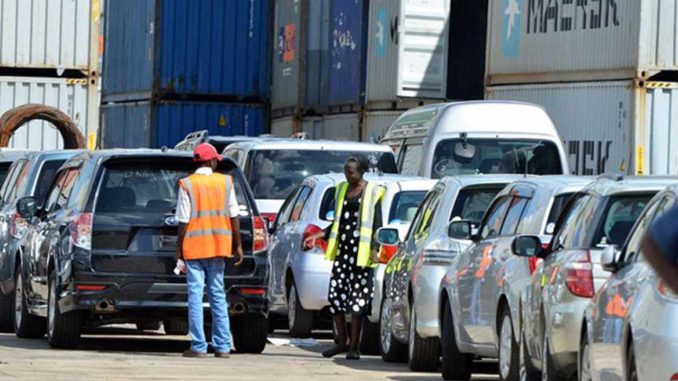
Jolted by a presidential directive that revenue generation needs to be enhanced in the light of the dwindling profile, the Nigeria Customs Service (NCS), has called on the Federal Government to reduce the 35 per cent levy on imported vehicles to checkmate the rising cases of smuggling into the country. This request is curious. The customs service would not ordinarily make such a request. The NCS asked for increased tariff to boost its revenue since revenue generation has become its main preoccupation.
Ironically, expected increased revenue has been elusive as the NCS has been losing out while smugglers have been reaping a windfall as most importers divert their goods to the neighbouring ports in Cotonou and Lome with lower tariffs and quicker turnaround time.
Consequently, the agency’s targets have not been met. That explains why it is making a fiscal policy reversal, requesting that the levy on imported vehicles be reduced. There is no doubt that government needs to mobilise funds for its developmental projects and the customs is one major source of such revenue.
According to reports, the Comptroller-General of Customs, Hameed Ali, who orchestrated the high tariffs in the first place, called on the Federal Government to reduce import duty on motor vehicles to 45 per cent from 70 per cent.
This is the moment of truth for Ali who disclosed this in Abuja at the unveiling of a Strategic Revenue Growth Initiative, which was held at the Federal Ministry of Finance.
According to him, currently, new imported vehicles into the country attract 35 per cent import duty and an additional 35 per cent levy, which brings the total payable to 70 per cent.
In was interesting that the custom authorities have described the 70 per cent being charged as high, adding that the time has come to reduce it to 45 per cent.While insisting that the 35 per cent import duty should remain, he said that the additional 35 per cent charge should be reduced to 10 per cent making a total of 45 per cent duty payable on new vehicles.
Ali had realistically argued that having interacted with stakeholders, it was discovered that the sudden increase in duty is what is driving importers away besides increasing the rate of smuggling into the country.
While noting that most of the vehicles being smuggled are second hand brought through the land borders, he recalled that the 35 per cent levy was a policy thrust by government to encourage our local automotive industry to develop. He said reducing the levy would boost the volume of imported vehicles and increase the customs’ revenue.
It was also strategic that the Minister of Finance, Mrs. Zainab Ahmed, who unveiled the Strategic Revenue Growth Initiative, noted that government was concerned about the inability of its agencies to meet their revenue targets.
She admitted that it had become a challenge for government to mobilise fiscal resources to deliver on its developmental objectives, noting that President Muhammadu Buhari had directed revenue-generating agencies to enhance their performance.
The reality check now is that while oil revenue to Gross Domestic Product ratio stands at about 39 per cent, non-oil revenue to non-oil GDP is about 4.2 per cent. Besides, revenue generated from excise duty stood at 4.1 per cent far lower than Ghana’s 15.3 per cent and Kenya’s 19.5 per cent at the same time. Furthermore, the country’s Value Added Tax revenue to GDP stood at less than one per cent compared to ECOWAS 3.4 per cent.
As was noted at the Abuja reality-check event, Nigeria’s low revenue generation capabilities have been an enduring challenge to past and present governments.
It is not surprising, therefore, that the customs is regularly devising both conventional and unconventional strategies to garner revenue and meet its target. For instance, after giving itself a whopping N1.1 trillion revenue target in 2017, Ali mandated vehicle owners to crosscheck their customs papers or risk their vehicles being impounded. Whereas, the customs targeted N1.3 trillion revenue in 2018, it reduced the target in 2019 to N887 billion apparently as a result of the reduced importation into the country.
The tension and fury generated by the directive was doused only after the Senate intervened and directed the customs to suspend implementation of the policy. Despite that some customs officers were still spotted along Lagos-Benin routes.
But amidst this cacophony of the customs service as a revenue agency, not long ago, Vice President Yemi Osinbajo cited the customs as a cesspit of corruption. There is therefore a nexus between that perception and thriving smuggling around our border posts.
Whatever happened to the government’s policy of encouraging local production of vehicles, a development that would have created jobs for hundreds of citizens, it is still curious why the ease of doing business initiative has not attracted investors in the area of getting vehicle assembly plants, despite our size of the auto market in the country.
In the main, the request for the reduction of import levy is in public interest and should be duly considered by the government – to boost revenue and to lessen the burden of those who want to buy cars since mass transit system is not a priority in Africa’s most populous nation.
END

Be the first to comment